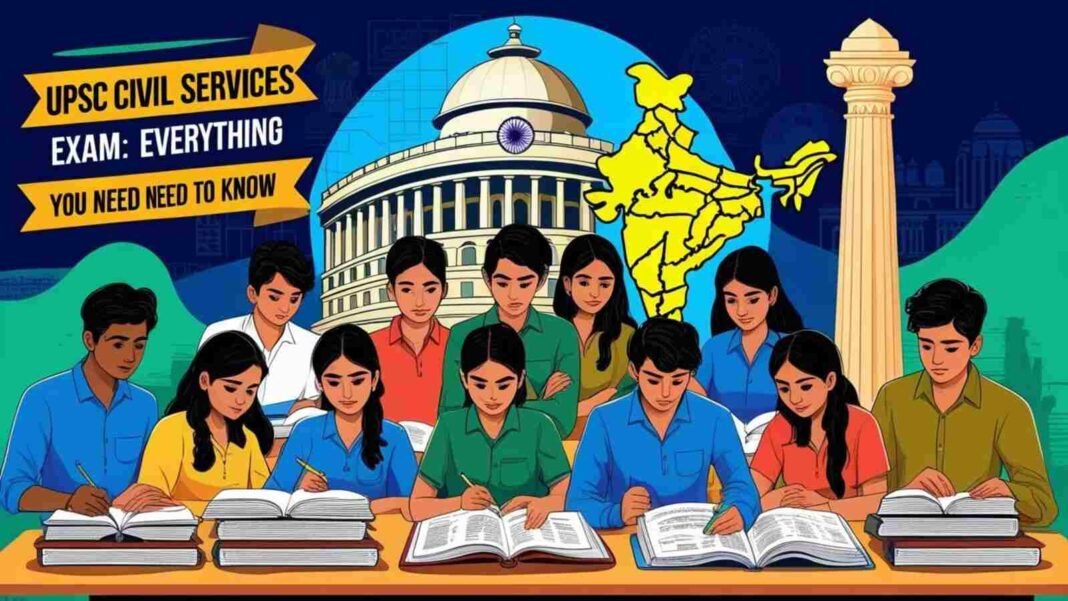The Union Public Service Commission (UPSC) Civil Services Examination (CSE) is one of the most prestigious and competitive exams in India. It opens the door to extremely respected administrative positions such as the Indian Administrative Service (IAS), Indian Police Service (IPS), Indian Foreign Service (IFS), and many others. Every year, lakhs of aspirants hold, but only a few hundred pass it. If you are provision to take this exam, this draw will supply you with everything you need to experience the UPSC CSE — from the exam structure to reading tips.
What Is the UPSC CSE?
The UPSC CSE is a nationwide competitory examination conducted annually by the Union Public Service Commission. Its objective is to recruit officers for the top civil services under the Government of India. It is considered one of the toughest exams due to its very vast syllabus and stringent selection process.
Exam Structure: Stages of the UPSC CSE
The exam is conducted in three stages:
1. Preliminary Examination (Prelims)
-
Objective type (MCQs)
-
Comprises two papers:
-
General Studies Paper I
-
CSAT (Civil Services Aptitude Test) – Paper II
-
-
Serves as a screening test; marks not counted in the final merit.
2. Main Examination (Mains)
- Descriptive in nature
- Includes 9 papers, of which 7 are counted for merit:
- Essay Paper
- Four General Studies Papers
- Two Optional Subject Papers (e.g., Law, Geography, Sociology, etc.)
Two language papers are qualifying in nature.
3. Personality Test (Interview)
- Conducted by a panel of UPSC
-
Assesses candidate’s personality, ethics, and suitability for public service
Eligibility Criteria
-
Nationality: Indian for IAS and IPS; other rules apply for other services.
-
Age Limit:
-
General: 21 to 32 years
-
OBC: Up to 35 years
-
SC/ST: Up to 37 years
-
-
Educational Qualification: A graduate degree in any discipline from a recognized university.
-
Number of Attempts:
-
General: 6
-
OBC: 9
-
SC/ST: Unlimited (till age limit)
-
Why Choose Law Optional at Plutus IAS?
Choosing Law Optional for the UPSC Civil Services Exam can be a game-changer—especially when backed by expert coaching very like that offered at Plutus IAS. Law as an optional quite dependent is concise, logical, and highly scoring when prepared with the redress strategy. It significantly overlaps with GS papers extremely same Polity, Governance, and Ethics, gift aspirants an sharpness in the Mains examination.
Syllabus Overview
The UPSC syllabus covers a astray range of subjects:
- Prelims: Indian History, Polity, Economy, Environment, Geography, Current Affairs
- Mains GS Papers:
- Indian Heritage & Culture, Governance, Social Justice, Ethics
- Economy, International Relations, Disaster Management, Internal Security
- Optional Subjects: Choose from a list (e.g., Law, Public Administration, Sociology, Anthropology, etc.)
How to Prepare for UPSC CSE
1. Start Early & Understand the Syllabus
Understanding the syllabus is the first step. Begin your preparation 12–18 months before the exam.
2. Build a Strong Foundation
NCERT books are essential for building conceptual clarity. Follow them up with standard reference books.
3. Stay Updated with Current Affairs
Read newspapers like The Hindu or Indian Express and refer to monthly current affairs magazines.
4. Practice Answer Writing
Answer writing is crucial for Mains. Join a test series or coaching program to enhance your writing skills.
5. Mock Tests & Revisions
Regular mock tests for both Prelims and Mains improve speed and accuracy. Revise regularly to retain information.
Final Thoughts
Cracking the UPSC Civil Services Examination requires a blend of quite hard act, substance, smartness strategy, and self-denial. Whether you opt for self-study or coaching, having a clear-cut design and staying motivated throughout the journeying is key. With the correct steering and focused effort, your dream of serving the country through the civil services can become a reality.



